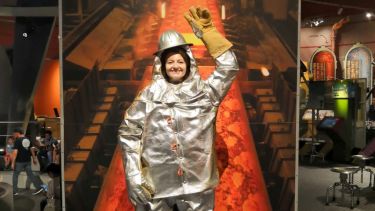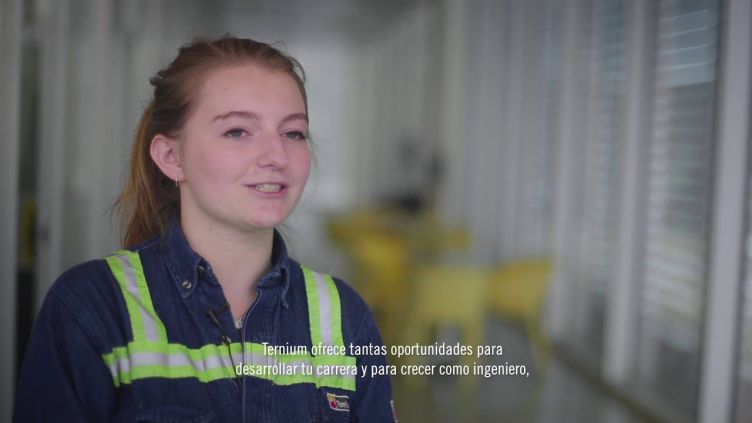Far more women are not just getting into [engineering], but thriving in their careers.

Read: our interview with Kathryn.
What is your background and why did you choose engineering as a career path?
As a child I was always very curious, I enjoyed making things and was always asking my parents how things worked. Given that my Dad was an engineer, he fostered my inquisitive side, explaining things to me and letting me help out whenever he was making something for the house. This side of me was also evident in my interest in maths and science all throughout my school career. However, it was once I started to study Design and Technology that I was attracted more towards the manufacture of products and how they were engineered, rather than focus solely on the science. When it came to applying to university and deciding a career path, it was clear that engineering was the perfect mix of my interests; being able to understand how to design a product based on the underlying maths and science, while still making it practical for large-scale manufacture.
Why did you choose Materials Science & Engineering at the University of Sheffield?
Having considered a few alternative engineering disciplines, it was while we were studying smart materials in Design and Technology that I started to shift towards the idea of studying Materials Science. I had already seen that materials selection could have a huge impact on a product’s performance and that for many existing products, material advancement was the primary avenue for improvement. However, once I realised just how broad the field is, I concluded that this was what I wanted to go into full-time. As a subject, it covers all engineering disciplines, meaning that one day I could be studying superalloys for high temperature applications in jet engines and the next, investigating bio-materials for scaffolds or implants. I specifically chose to study at Sheffield because it was one of the few universities that gave the option to study a language alongside my core engineering modules, meaning I would not have to sacrifice another of my key passions as I progressed through my career. The amount of industry involvement throughout the course was also a key factor in my choice. Working with multiple industrial sponsors in the Industrial Training Programs and the compulsory placement in the MEng course meant that I knew I would be able to apply the knowledge I had gained in modules to real life engineering problems. However, what finally consolidated Sheffield as my final choice was the friendliness and openness of the department. As a relatively small department, all the staff made everyone so welcome and you really saw that they were not lying about Materials being a ‘family’. Everyone seemed to know everyone, and the staff members were all keen to help each student reach their full potential. It was this combination of factors that made me certain that Sheffield was right for me.
What has been the highlight of your engineering journey so far?
The University of Sheffield has helped me develop as an engineer in so many ways, making it hard to choose a highlight. However, in terms of personal and professional development, I would have to say that the summer I spent working with Ternium in Monterrey, Mexico is definitely the highlight. As I arrived, I was provided a brief to investigate whether the Image Quality measurement from EBSD scan data could be used to identify and quantify steel microstructures. The project was assigned solely to me, which initially was incredibly daunting, but in fact was an excellent experience in self-management; it was a challenge I was expected to rise to. As the weeks progressed, I could feel myself becoming more confident not only in my problem solving and engineering ability, but in myself as a person. I matured and expanded my skillset incredibly rapidly, working with new softwares to develop methodologies and analysing the resulting data. It was incredibly rewarding being able to work for an industry leader on a current, relevant problem that they were facing, and all before finishing my undergraduate degree! It was a chance to not only build on the materials science knowledge I had from the course, but also to set me up with the relevant skills for a future career in Materials Science. It was also an opportunity to really push myself out of my comfort zone and completely immerse myself in a different culture. More than just improving my Spanish, I had the privilege of meeting and working with new people from completely different backgrounds and experiences to me, as well as trying the famous Mexican cuisine!
My time with Ternium was not only valuable work experience that helped me progress as an engineer, but also a once-in-a-lifetime personal experience that I would recommend to anyone.
Kathryn Baker
Materials Science & Engineering Student
What does the future hold for you?
The time I spent working with Ternium gave me a taste of what it is like to work in a real-life engineering role for a large-scale manufacturer. The challenges that it offered and the satisfaction of working on a meaningful project have made me keen to continue within a similar role in the future. I have particularly enjoyed the aerospace context in which many of our modules have been taught so I am initially keen to move into the aerospace or automotive sector. Given the increasing pressures on these industries to adapt to more sustainable solutions with the issue of climate change, the challenges they are facing are enormous, something that I would love to be involved with. Extracurricular activities I have completed during my time at Sheffield, such as the CodeFirst: Girls courses, have also given me an interest in coding and data analysis. My goal for the future would be to work in a role that combined these two passions of mine, where I am able to use coding and digital solutions to solve present-day and future engineering problems. In the long term, I am keen to keep expanding and developing the skillset and expertise I have acquired at university to work towards a managerial role. This would allow me to inspire and help others within my team to progress and reach their full potential, similar to how many of my lecturers and managers have helped me progress as an engineer.
What would you say to someone thinking about studying engineering?
I would firstly make the point that, even though sometimes it may not be the most glamorous job, it is definitely worth investing in a good pair of steel-toe capped boots but engineers are not the stereotypes in high-vis vests that you see on TV. Given the range of disciplines and specialisms that exist within the field, I think the only way to define an engineer is one of the people that help to keep the world running smoothly. That may be from behind a desk running computer simulations or in the field on an offshore oil rig; you really do not know where you will end up. I think this particularly applies for women as well, where engineering has traditionally been considered a very male-dominated field. Personally in my albeit short time as an engineer, I have noticed that far more women are not just getting into, but thriving in their careers with some of the most inspirational and dedicated engineering leaders I have met being women. The engineering workplace, especially in recent generations, is becoming a far more equal in terms of opportunities. I would also add that you do not need to worry too much about specialising too early on within your degree. Especially at the University of Sheffield, there are plenty of opportunities to test the waters with such a broad range of modules, projects and extra-curricular activities; eventually you will find what you are most passionate about. You will also develop such a broad range of transferable skills that will set you up to work almost anywhere so you do not worry about finding a job, the world will always have problems to solve! Essentially, if you have an insatiable, inquisitive mind, like seeing how things work and are a keen problem-solver, a better career for you does not exist.
What’s the best thing about being an engineer?
The best thing about being an engineer is the interdisciplinary nature of the job. Although most of the grounding for projects is in maths and science, it is in no way limited to this and you get the opportunity to show your design and creative flair. It also lets you work with an incredibly diverse range of people, allowing you to learn from their expertise and experience. The work is really hands on and no two projects are ever the same so it is almost impossible to get bored. You also get the satisfaction of being able to work on a project from conception through to completion, being able to visualise the progress and the difference that you have made. It is also an incredibly fulfilling job, as the tangible results you produce show that the projects and problems that you are working on can really make a difference to other people’s lives. As I have seen personally, engineering is also a career that offers great opportunities for travel. Problem solving is an in-demand skill worldwide so the job could take you anywhere. Overall, I would say that being an engineer is incredibly rewarding.
Watch: Kathryn's experience with Ternium, Mexico.
We interviewed Kathryn in 2019.

International undergraduate scholarships
We are offering scholarships of £2,500 for each year (subject to a 60% average) of your undergraduate degree. The maximum value is £10,000 for four-year programmes.


